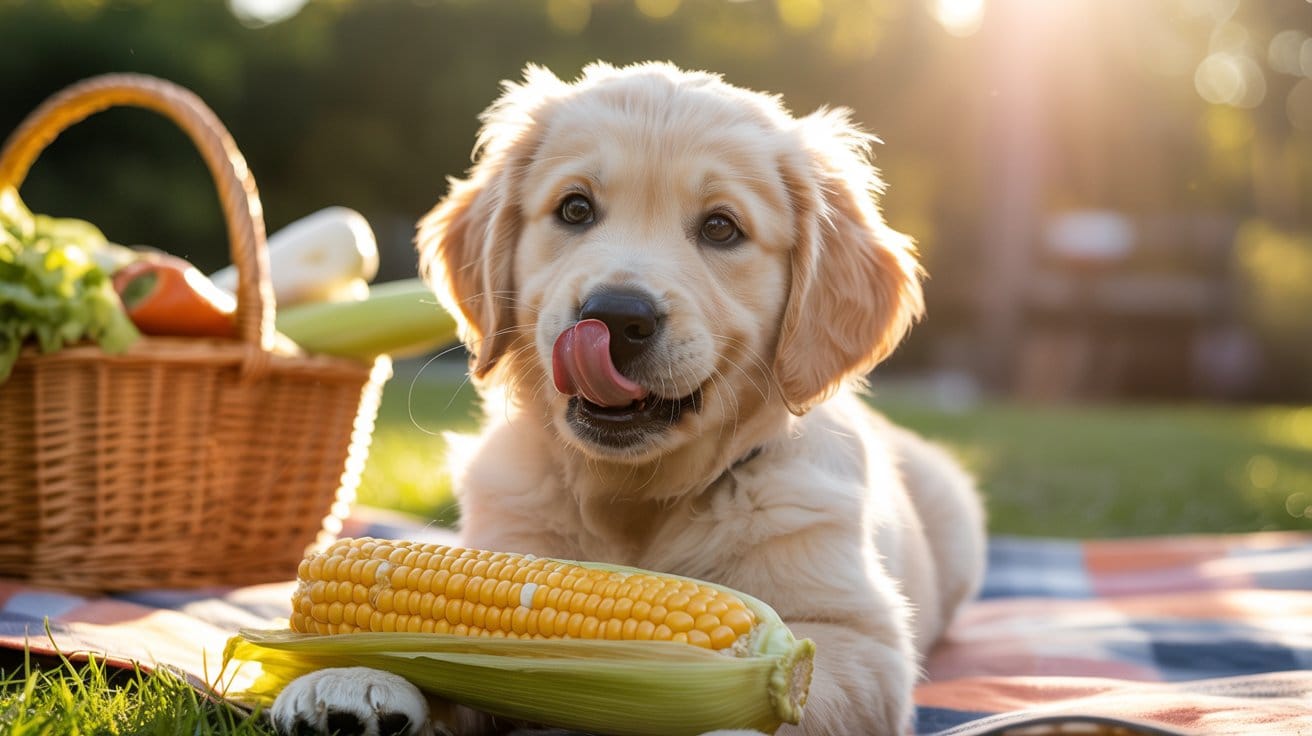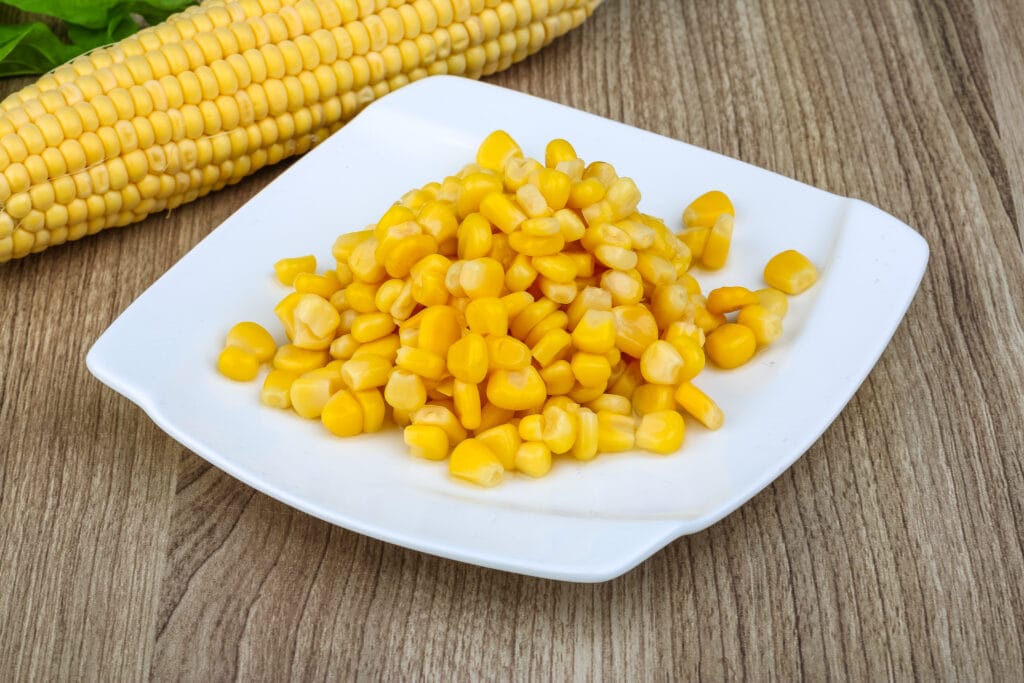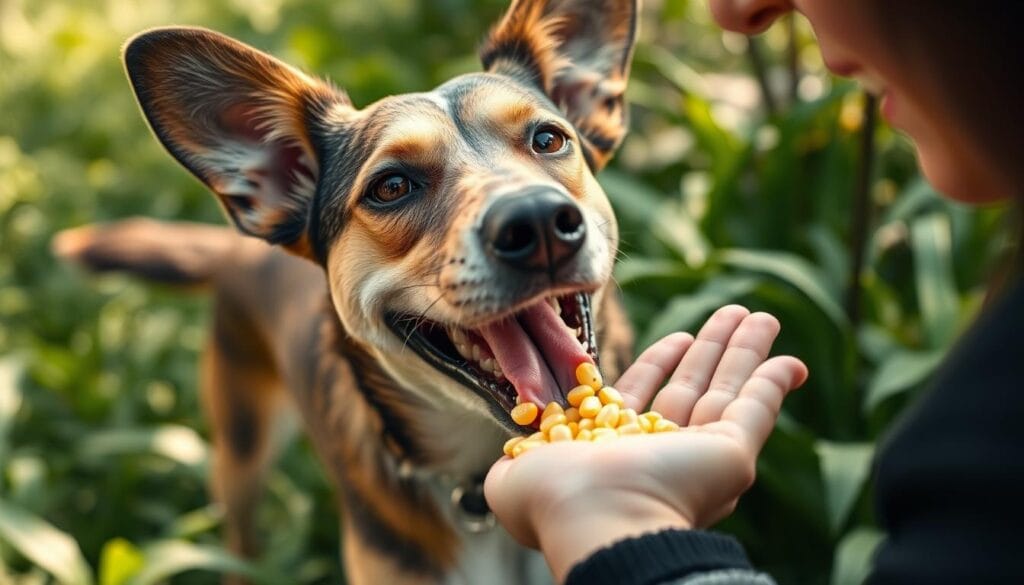Can Dogs Eat Corn? 8 Shocking Pros and Cons Revealed

As a dog owner, you might have wondered if your pet can eat human food. A big question is whether dogs can eat corn. This topic is debated by many pet owners and vets.
Some think corn is good for dogs, while others believe it’s bad. The truth is, it depends on several things.
In this article, we’ll look at the good and bad sides of corn for dogs to answer the question: can dogs eat corn? This will help you decide what’s best for your pet
Table of Contents
The Truth About Dogs and Corn
Dog owners often ask if corn is good for their pets. Corn is common in many dog foods. It plays a big role in a dog’s diet.
What You Need to Know About Corn for Dogs
Can dogs eat corn? Corn isn’t toxic to dogs, but its value and digestibility can change. Corn has carbs, fiber, and vitamins and minerals. But, how corn is given to dogs and their sensitivities matter a lot
Experts say, “The value of corn for dogs depends on how it’s prepared and the dog’s health.” This shows the need for careful preparation and watching the dog’s health.
Common Misconceptions About Feeding Corn to Dogs
Can dogs eat corn? Some think corn is bad for dogs because of allergies and digestive problems. But, not all dogs react badly to corn. Many dogs can handle corn just fine. Also, corn is often used as a filler, but it’s not empty of nutrients.
It’s important to see both sides of corn in a dog’s diet. This means choosing food based on the dog’s needs and health.
Can Dogs Eat Corn? The Definitive Answer
Can dogs eat corn? Corn is common in human diets, but its safety for dogs is debated. Some owners think it’s okay to share corn with their dogs. But others worry about its health effects.
Is Corn Safe for Most Dogs?
Can dogs eat corn? Most dogs can eat corn without harm. But, it’s important to watch for any allergies or sensitivities. Corn can be good for dogs if given the right way. Make sure to remove the cob to avoid choking or blockages.
When Corn Becomes Dangerous for Your Dog
Can dogs eat corn? Corn can be risky if not prepared right or if a dog has allergies. Corn cobs are especially dangerous because they can block the intestines or cause digestive problems. Dogs with allergies might also have reactions like itching or upset stomachs.
Veterinary Perspectives on Corn in Canine Diets
Can dogs eat corn? Vets say corn is usually safe for dogs in small amounts. But, they stress the need for a balanced diet. Some vets suggest choosing high-quality corn and cooking it well. A plain, cooked corn kernel is safer than processed corn with additives.
Nutritional Profile of Corn for Canines
Knowing what corn offers is key for dog owners. It’s a topic of debate in dog food due to its mixed effects. But, when used right, corn can be good for dogs.
Key Nutrients in Corn
Can dogs eat corn? Yes! Corn is packed with nutrients good for dogs. It’s full of dietary fiber for healthy digestion. It also has essential fatty acids like linoleic acid for skin and coat health.
Plus, corn has vitamins and minerals like thiamine, folate, and phosphorus. These help with energy and overall health.
The nutrients in corn depend on its form and preparation. Whole corn kernels keep more nutrients than processed corn.
How Corn Fits Into a Dog’s Dietary Needs
Can dogs eat corn? Yes, corn can be part of a balanced diet for dogs, in small amounts. It’s a complex carbohydrate source for energy. But, dogs need more protein than carbs.
So, corn should be a supplement, not the main food. It helps with digestion, skin, and coat health, and adds vitamins and minerals.
- Corn can help support digestive health through its fiber content.
- It provides essential fatty acids for skin and coat health.
- Corn is a source of various vitamins and minerals.
By knowing corn’s nutritional value, pet owners can make better choices for their dogs’ diets.
4 Surprising Benefits of Feeding Corn to Your Dog
Can dogs eat corn? Many dog owners are careful about giving corn to their pets. But, it has many health benefits. When cooked right, corn can be a great part of a dog’s diet.

Rich Source of Dietary Fiber for Digestive Health
Can dogs eat corn? Yes, corn is full of dietary fiber, which is key for a dog’s digestive health. A diet rich in fiber helps keep bowel movements regular. It also prevents constipation and supports good gut bacteria.
This can lower stomach problems and improve overall digestive health.
Antioxidants and Carotenoids for Eye Health
Can dogs eat corn? Yes, they certainly can. Corn has antioxidants and carotenoids like lutein and zeaxanthin. These are good for a dog’s eyes. They protect the eyes from damage and may lower the risk of eye problems as dogs age.
Feeding corn can help keep a dog’s vision and eye health strong.
Complex Carbohydrates for Sustained Energy
Can dogs eat corn? They certainly can. Corn is packed with complex carbohydrates. These give dogs steady energy. Unlike simple carbs, complex carbs don’t cause blood sugar spikes and crashes.
This makes corn great for active dogs or those needing lots of energy.
Essential Fatty Acids for Healthy Skin and Coat
Can dogs eat corn? They certainly can. Corn also has essential fatty acids. These are crucial for a dog’s skin and coat health. They nourish the skin, reduce inflammation, and make the coat shiny and healthy.
Adding corn to a dog’s diet can improve their skin and coat.
4 Hidden Dangers of Corn That Dog Owners Should Know
Corn is a common food in dog diets but has hidden dangers. It can be good for them, but there are risks. Owners need to know about these risks.
Danger1: Corn Allergies and Sensitivities in Dogs
Can dogs eat corn? Yes, but some dogs can’t handle it and may get skin problems or digestive issues. If your dog shows signs of an allergy after eating corn, see a vet. They can help figure out what to do next.
Danger2: Corn Cobs as Serious Choking and Intestinal Blockage Hazards
Corn cobs are a big risk for dogs. They can choke or block their intestines if eaten. Keep corn cobs away from your pets and throw them out safely.
Danger3: Digestive Issues and Upset Stomach
Some dogs have trouble digesting corn. This can lead to stomach upset, gas, or diarrhea. Watch how your dog reacts to corn and adjust their diet if needed.
Danger4: Caloric Density and Potential for Weight Gain
Corn has a lot of calories, which can make dogs gain weight. Owners should watch how much corn their dogs eat. Make sure their diet is balanced to keep them at a healthy weight.
In summary, while corn can be okay for dogs, owners need to be careful. Knowing the dangers and taking steps to avoid them is important. Regular vet visits and a balanced diet are key to your dog’s health.
Different Forms of Corn and Their Safety for Dogs
Feeding corn to dogs can be safe if you know the different forms. Corn can be good for dogs, but it depends on how it’s prepared and what form it’s in.
Fresh Corn Kernels: Raw vs. Cooked
Can dogs eat corn? Certainly. Fresh corn kernels are a healthy snack for dogs. Raw corn is usually safe, but cooking it makes the nutrients easier to digest. It’s important to remove the kernels from the cob to avoid choking or blockages. Cooked corn kernels are easier to digest, which is better for dogs with sensitive stomachs.

Corn Products: Cornmeal, Corn Flour, and Corn Syrup
Cornmeal and corn flour are common in dog foods and treats. But, make sure they don’t have harmful additives. Corn syrup is not good because it’s high in sugar and can lead to obesity and health problems in dogs.
“The quality of corn-based ingredients can vary significantly depending on the manufacturing process and source material.”
Processed Corn: Popcorn, Corn Chips, and Corn Cereals
Processed corn products like popcorn, corn chips, and corn cereals are not good for dogs. They often have additives, seasonings, and too much salt or sugar. Plain, air-popped popcorn is safe in small amounts, but make sure to remove any unpopped kernels.
GMO vs. Organic Corn Considerations
Choose organic corn for your dog to avoid GMOs. While GMOs are generally safe, some people prefer organic. Organic corn is a cleaner choice, but it might cost more.
| Type of Corn | Safety for Dogs | Precautions |
|---|---|---|
| Fresh Corn Kernels | Generally Safe | Remove from cob, cook for easier digestion |
| Cornmeal/Corn Flour | Safe in moderation | Check for additives |
| Corn Syrup | Not Recommended | High sugar content |
| Processed Corn Products | Generally Not Recommended | Avoid additives, salt, and sugar |
How to Safely Introduce Corn to Your Dog’s Diet
To make sure your dog enjoys corn, introduce it carefully. Corn can be a great addition to their diet if done right.
Proper Preparation Methods for Maximum Safety
Cooking corn is a good way to make it easier for dogs to digest. Avoid adding seasonings or oils that can harm them. Plain, cooked corn kernels are the safest choice.
Recommended Serving Sizes by Dog Weight and Age
The right amount of corn for dogs depends on their size and age. A small dog might get a teaspoon, while bigger dogs can have up to a tablespoon. Always adjust the amount based on your dog’s needs.
Monitoring Your Dog After Introducing Corn
Watch your dog closely after introducing corn. Look for signs of allergy or sensitivity like itching, digestive issues, or skin problems. If you notice any issues, talk to a vet to figure out what to do next.
Special Considerations for Different Dogs
Feeding corn to dogs isn’t a one-size-fits-all decision. Age, breed, and health status all play a role. Each dog has unique needs and sensitivities to consider when deciding about corn in their diet.
Puppies and Corn: Development Considerations
Puppies need a diet full of nutrients for their fast growth and development. Corn can be part of their diet, but in moderation. It should also be cooked well to help with digestion. Puppies have sensitive stomachs, so watching how they react to corn is key.
Senior Dogs and Corn Digestibility
Senior dogs find it harder to digest food, including corn, as they age. If they eat corn, it should be easy to digest, like cooked or pureed. Owners should watch for any signs of digestive trouble.
Breed-Specific Sensitivities to Corn
Some dog breeds may be allergic or sensitive to corn. Breeds prone to allergies or skin issues might not do well with corn. Owners of these breeds should be careful and talk to a vet before adding corn to their dog’s diet.
Dogs with Existing Health Conditions
Dogs with health issues like diabetes, obesity, or gastrointestinal problems need special diets. Corn can be a problem for them because of its carbs and how it might affect blood sugar or weight. It’s best to talk to a vet to find the right diet for these dogs.
| Dog Category | Corn Feeding Considerations | Recommended Form of Corn |
|---|---|---|
| Puppies | Introduce in moderation, monitor digestion | Cooked corn |
| Senior Dogs | Easy to digest form, monitor for discomfort | Cooked or pureed corn |
| Breeds with Sensitivities | Consult vet, watch for adverse reactions | Avoid or limit corn |
| Dogs with Health Conditions | Consult vet, consider carbohydrate content | Limit or avoid corn |
Corn in Commercial Dog Foods: What Every Owner Should Know
It’s important for dog owners to know what’s in their pet’s food. Corn is often found in dog food. It acts as a filler, a carb source, and a binder.
Some people think corn is cheap and not good for dogs. Others believe it’s a great energy source. Knowing corn’s role in dog food helps owners make better choices.
Understanding Ingredient Labels and Corn Derivatives
Dog owners should look out for different types of corn on labels. Ingredients like cornmeal, corn flour, and corn syrup are common. Reading labels carefully helps spot these.
Quality Differences in Corn-Based Ingredients
The quality of corn in dog food can vary. Good corn is full of nutrients and keeps them during processing. Here’s a comparison of different corn ingredients:
| Corn Ingredient | Nutritional Value | Processing Method |
|---|---|---|
| Cornmeal | High in fiber | Ground corn kernels |
| Corn Flour | Rich in carbohydrates | Finely ground corn |
| Corn Syrup | High in sugar | Liquid derived from corn starch |
Corn-Free Alternatives in Commercial Dog Foods
For dogs with corn allergies, there are corn-free options. These foods use sweet potatoes or green peas instead. Switching to these foods requires monitoring your dog’s response and talking to a vet.
Sources:
https://mvavets.com/blog/can-dogs-eat-corn/?
https://www.petmd.com/dog/nutrition/evr_dg_whats_in_a_balanced_dog_food?utm_source=chatgpt.com
https://www.akc.org/expert-advice/nutrition/corn-in-dog-food-what-you-need-to-know/?
https://www.akc.org/expert-advice/nutrition/can-dogs-eat-corn/?
https://www.petmd.com/dog/nutrition/can-dogs-eat-corn?
Conclusion: Making the Right Decision About Corn for Your Dog
Dog owners now know the good and bad of giving corn to their dogs. It’s important to think about what’s best for each dog. This means looking at the benefits and risks carefully.
Thinking about “can dogs eat corn” means it can be good if done right. Owners should choose “dog friendly foods” like corn. It gives dogs important nutrients, fiber, and energy.
To make sure corn is safe for dogs, owners need to watch for allergies and digestive problems. They also need to avoid giving corn cobs. By doing this, owners can keep their dogs safe.
Finally, deciding if corn is right for a dog’s diet should involve a vet. They consider the dog’s age, breed, health, and diet needs. This way, owners can give their dogs a healthy and balanced diet.



